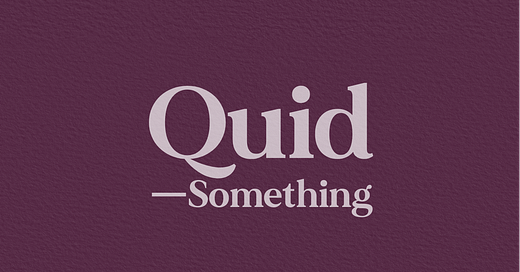Quid (transl. Something)
🗓️ 25 giugno 2024 — One of the ingredients behind every great story.
🎙️ COME SI PRONUNCIA?
[koo-EED]
PRONOUN
Something
🇮🇹 Qualche cosa di indeterminato o non facilmente definibile.
🇬🇧 Something indefinite or not easily defined
💬 ESEMPI
C’è in lui un quid che non mi convince.
There is something about him that doesn’t convince me.
Marcello ha quel quid che lo rende più attraente rispetto ai suoi amici.
Marcello has that certain something that makes him more attractive than his friends.
🔎 L’ORIGINE DELLA PAROLA
🇮🇹 Quid deriva dal pronome neutro latino quid, che significa “qualche cosa”.
🇬🇧 Quid comes from the Latin neuter pronoun quid, which means "something".
🤓 LO SAPEVI CHE…
IMPRESS YOUR ITALIAN FRIENDS WITH CURIOUS FACTS ABOUT ITALY AND ITS CULTURE
🇮🇹 Uno degli ingredienti dietro ogni grande storia.
La locuzione latina “Quis, quid, ubi, quibus auxiliis, cur, quomodo, quando?” tradotta letteralmente significa “chi, che cosa, dove, con quali mezzi, perché, in qual modo, quando?”.
Questa frase scritta da Cicerone nel suo trattato Rhetoricorum, seu De inventione rhetorica contiene i criteri fondamentali per la composizione letteraria.
Ma cosa significano esattamente questi termini?
Quis → Chi compie l'azione.
Quid → Cosa viene fatto.
Ubi → Dove avviene l'azione.
Quibus auxiliis → Con quali mezzi si compie l'azione.
Cur → Perché viene compiuta l'azione.
Quomodo → In che modo si realizza l'azione.
Quando → Quando si verifica l'azione.
Questa formula è stata ripresa nel mondo giornalistico anglosassone moderno come la "Regola delle 5 W": Who?, What?, Where?, When?, Why? (chi?, cosa?, dove?, quando?, perché?).
Anche se le lingue e i contesti sono cambiati, i principi fondamentali della narrazione rimangono gli stessi.
🇬🇧 One of the ingredients behind every great story
The Latin phrase “Quis, quid, ubi, quibus auxiliis, cur, quomodo, quando?” literally translates to “who, what, where, with what means, why, how, when?”.
This phrase written by Cicero in his treatise Rhetoricorum, seu De inventione rhetorica, contains the fundamental criteria for literary composition.
But what do these terms mean exactly?
Quis → Who performs the action.
Quid → What is being done.
Ubi → Where the action takes place.
Quibus auxiliis → With what means the action is performed.
Cur → Why the action is performed.
Quomodo → How the action is carried out.
Quando → When the action takes place.
The Anglo-Saxon modern journalism has adopted this formula as the "Rule of the 5 Ws": Who?, What?, Where?, When?, Why?
Even though languages and contexts have changed, the fundamental principles of storytelling remain the same.
👉 YOUR TURN
Can you use the word QUID correctly in a sentence?
Based on the definition and examples provided, write a sentence using today's word of the day and share it as a comment on this post. It is important that your sentence makes sense and shows that you understand the word's definition, but we also encourage you to use creativity and have fun.




Questo caffè brasiliano ha un quid che crea un gusto rotondo e morbido.
Questo cibo ha un quid speciale che me piace molto!